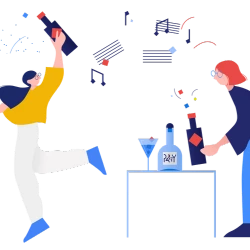Wisconsin’s food and beverage industry generates more than $100 billion annually. However, businesses wanting to sell alcohol for consumption must obtain the correct liquor license. Not doing so can result in financial or criminal penalties. Bars, taverns, restaurants, and hotels seeking to sell liquor are subject to state licensing quotas, making it challenging to enter hospitality.
If you’re starting a new business or seeking a Wisconsin liquor license for an existing business, start the process correctly to avoid any delays. This guide explores types of Wisconsin liquor licenses, liquor license requirements in Wisconsin, how to apply for a Wisconsin liquor license, and other related topics. Read ahead if you’re ready to enter the thriving beverage industry in Wisconsin!
Types of Wisconsin Liquor Licenses
For the purpose of this guide, we will cover Wisconsin retail liquor licenses. There are various types of liquor licenses available in Wisconsin. Let’s explore the alcoholic beverage license options in more detail below:

Beer Retail License
If your business only plans to sell beer, you’ll require one of the following beer licenses:
- Class “A” Beer Licenses (Stores): This license is for retail locations selling beer for off-premises consumption. The beer must be in its original packaging.
- Class “B” Beer Licenses (Bars, Taverns, Restaurants, Hotels, and Resorts): This license is for businesses selling beer for off-premises and on-premises consumption.

Liquor Retail Licenses
If you sell liquor, wine, or cider, you’ll need a liquor license instead of a beer license (in some cases, you’ll need both). Let’s explore the alcohol license options in more detail:
- “Class A” Liquor Licenses (Stores): This license allows the sale of liquor for off-premises consumption. The liquor must be in its original packaging. Stipulations also allow a limited number of on-premises tasting samples for spirits and wine.
- “Class A” Cider-Only Licenses (Stores): This license allows stores to sell cider for off-premises consumption. To obtain it, the store must first have a Class “A” Beer License (Store).
- “Class B” Liquor Licenses (Bars, Taverns, Restaurants, Hotels, and Resorts): This allows a business to sell liquor by the glass for off-premises or on-premises consumption, provided the liquor is not in its original packaging. If the liquor is for off-premises consumption, the business must seal the drink with a tamper-evident seal. Likewise, the business owner can sell liquor in its original packaging for off-premises consumption. The business must have a Class “B” Beer License (Bar, Tavern, Restaurant, Hotel, and Resort) to obtain this license. This license is subject to quotas, so it’s usually the most challenging license to obtain.
- “Class C” Wine-Only Licenses (Restaurants): This license allows businesses to sell wine for on-site consumption by the glass or in an opened container. It also permits off-site sales if the bottle was initially served with food and recorked by the business.

What type of liquor license do I need?
As previously mentioned, the liquor license your business requires depends on the type of alcohol you’re selling and the premises you’re operating. For example, selling bottled beer at a convenience store requires a Class “A” Beer License (Store). However, if you’re operating a bar that sells beer, wine, and liquor to customers for on-premises consumption, you need a “Class B” Liquor License (Bar, Tavern, Restaurant, Hotel, and Resort).
This guide primarily covers retail liquor licenses. However, other permits are applicable if you have a niche alcohol-related business, such as a brewery. Make sure to explore the other license and permit types required by Wisconsin.
Liquor License Requirements for Wisconsin
The details required for a Wisconsin liquor license vary depending on the type of license you’re applying for. However, below are the core details required by most liquor license applications in the state:

- The type of liquor license your business is applying for
- The legal name of the business
- Wisconsin seller’s permit number
- Entity type
- Wisconsin DFI registration number
- Premises address
- Governing municipality
- Premises contact details
- Details about any previous legal issues related to the business
- Details regarding whether stakeholders have investments or interests in other alcohol-related businesses
- Personal details about owners, officers, directors, agents, etc.

Other necessary permits
You must have a seller’s permit before applying for a liquor license in Wisconsin. This is a permit required by any vendor selling taxable items in the state of Wisconsin.
In addition to a seller’s permit, you may also need local business permits from your municipality. Make sure to check if your local authorities have any additional license or permit requirements before you.
Understanding Liquor Laws in Wisconsin
Understanding liquor laws in Wisconsin is essential for any licensed premises. Failing to adhere to liquor laws may lead to the revoking of your license, as well as financial and criminal penalties. Let’s explore some of the key Wisconsin liquor laws below:
- Licensed premises must be subject to inspection at “all reasonable hours”
- All licensed premises must have someone on the premises with an operator’s license (or the privilege of an operator’s license)
- Individuals must be 18 years or over to sell or serve alcohol
- Municipalities have their own alcohol laws, so you must remain aware of local liquor laws
- Class A’s may not sell: Beer from Midnight to 8:00 am; Liquor from 9:00 pm to 8:00 am
- Class B’s may not sell: Beer & Liquor from 2:00 am – 6:00 am (Monday – Friday); Beer & Liquor from 2:30 am – 6:00 am (Saturday – Sunday)
However, the Wisconsin alcohol industry is currently evolving. In April 2024, the state passed laws that may force wedding venues to apply for new licenses — and activity in the Legislature indicates there may be further reform.[1]Spectrum News 1. “Wisconsin wedding barns face new regulations under liquor-law overhaul signed into law“. Accessed November 5th, 2024. Therefore, staying on top of Wisconsin liquor laws is critical.
How Much Does a Liquor License Cost in Wisconsin?
So, how much is a liquor license in Wisconsin? Unfortunately, there’s no exact pricing available for liquor licenses in Wisconsin, as municipalities charge varying prices. However, license prices generally fall between $110 and $860. To give a general idea of pricing, let’s explore the annual liquor license costs from Milwaukee, the largest city in Wisconsin:
- Class “A” Beer Licenses (Stores): $360
- Class “B” Beer Licenses (Bars, Taverns, Restaurants, Hotels, and Resorts): $110
- “Class A” Liquor Licenses (Stores): $860
- “Class B” Liquor Licenses (Bars, Taverns, Restaurants, Hotels, and Resorts): $610
- “Class C” Wine-Only Licenses (Restaurants): $510
How to Apply for a Liquor License in Wisconsin

In Wisconsin, most liquor licenses are issued by municipalities, meaning you must apply for a permit via the city or town where you are planning to conduct business. To apply for a liquor license in the state, start by identifying which municipality controls the liquor license in your area. Next, find the application for your municipality and fill out the details. For example, if you are opening a beverage business in Milwaukee, you can find all the application forms on the clerk county office website.
Once you submit all the required forms to your municipality, you must post a “Notice of Public Interest” outside the prospective licensed premises. Once you post the “Notice of Public Interest,” you must also officially notify your municipality via a Sworn Assurance of Posting. Next, you’ll be contacted to conduct an interview with your local authorities, and any individual applicants, partners, or agents in your business must take an approved Responsible Beverage Server course.
How to Renew Your Wisconsin Liquor License
Fortunately, once you have a liquor license in Wisconsin, the renewal process is much simpler than the initial application. Your municipality should send you a renewal notice each year with full details on renewing your license and paying your annual fees. Follow all instructions included in your renewal packet and contact your local municipality if you don’t receive any information about renewing your license.
Getting a Beer and Wine License in Wisconsin: Closing Thoughts
If you want to sell alcoholic beverages in Wisconsin, applying for a liquor license is critical. The sooner you begin the process, the quicker you’ll be able to start serving customers. While getting a “Class B” Liquor License (Bar, Tavern, Restaurant, Hotel, and Resort) can be challenging due to quota restrictions, the other types of liquor licenses available in the state are not difficult to obtain. Once you have your Wisconsin liquor license, you’ll have access to more than 3.7 million consumers over the age of 21.[2]Infoplease. “WI Demographic Statistics“. Accessed November 5th, 2024.
Obtaining payment processing services is critical to ensure your business has access to credit card payments. Therefore, partnering with a merchant account provider that supports alcohol sellers will ensure you have access to dependable credit card processing tools within your business. Likewise, our merchant account providers offer industry-specific tools, 24/7 support, and other benefits! Get in touch with us today to see what we can do for you!
Frequently Asked Questions
How long does it take to get a liquor license in Wisconsin?
The time it takes to receive a liquor license in Wisconsin varies depending on the municipality, but many businesses obtain one within four to six weeks. However, for a “Class B” Liquor License (Bar, Tavern, Restaurant, Hotel, and Resort), there are quotas in place that mean it may take much longer (or much more money) to obtain a license.
Do you need a liquor license to sell beer or wine in Wisconsin?
Generally, you need a liquor license to sell beer and wine to consumers in Wisconsin. While some exemptions exist, such as for breweries and wineries, these businesses still require other types of licenses to sell beer (such as a brewer’s permit).
Is it hard to get a liquor license in Wisconsin?
How hard it is to obtain a liquor license in Wisconsin varies depending on the type of license and the municipality where your business is located. Generally, it’s not difficult to obtain an alcohol license if you don’t have any previous convictions for criminal activity. However, as “Class B” Liquor Licenses (Bars, Taverns, Restaurants, Hotels, and Resorts) are subject to quotas, they’re much more challenging to obtain than other liquor license types.
How long does a Wisconsin liquor license last?
While there are temporary licenses available for special events, most Wisconsin alcohol licenses last one year. Make sure to renew your license annually to avoid losing your ability to sell or serve alcohol within your business.
How do I get a temporary or one-day liquor license in Wisconsin?
Wisconsin offers temporary licenses for selling alcohol at events in Wisconsin. However, the most popular license, the Temporary Class B license, only allows the sale of beer and wine. To sell liquor at your event, you must speak with your municipality about any special event licenses they offer.




